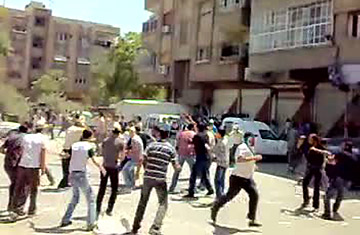
An image grab taken from footage posted on YouTube on July 15 shows Syrian antigovernment protesters running from security forces in Douma, a suburb of Damascus
(2 of 2)
Despite its tenacity, the protest movement has thus far failed to rally the support of the middle and upper classes in Damascus and Aleppo, the country's two most populous and important economic centers. It's unclear what, if anything, opposition groups are doing to engage the elites. One opposition figure at the Istanbul meeting, Wael al-Hafez, suggested a nationwide campaign of civil disobedience to "choke the regime economically and paralyze the state with the least damage." It's a risky strategy, and one that may backfire by drawing those same elites deeper into the regime's fold as economic action threatens their immediate interests.
Ziadeh argues that the only actors able to break the stalemate are the international community (via increased pressure and greater isolation of the regime) and the military. But Landis says that, so far, the backbone of Assad's power structure — the Alawite sect that dominates politics and the military, and the business elite — hasn't shown any indication of peeling away. Although there have been small-scale defections, the army's commanders remain loyal, and there's little chance of a palace coup. "The undercurrent of sectarian anger that is emerging in the protests has scared the Alawis and the minority communities in general," Landis says. The majority of Syrians are Sunnis, although there are sizable minorities of Christians, Alawites and Druze. "The warnings against rising Islamism, which were laughed at in the first months of the uprising, can no longer be taken so lightly."
Ziadeh agrees that the potential for civil strife is great, especially after the weekend's bloody events in the city of Homs, where at least 30 people were killed in clashes between pro- and anti-Assad crowds. Still, the real danger comes from those low-ranking military defectors, Ziadeh says, most of whom are Sunni. Dozens of soldiers reportedly defected in the eastern Syrian town of al-Boukamal on the weekend, activists claimed. Amateur video footage showed crowds chanting "The people and the army are one!" as they massed around three tanks. "If these defections continue, it may transform this into armed civil unrest and chaos because you will have two clearly armed sides," Ziadeh says.
The Muslim holy month of Ramadan (which starts in early August) is another potential deal breaker. Although it is traditionally a relaxed period in which offices close early and businesses slow down, nightly prayers also bring large crowds to the mosques. In Syria, that means a greater likelihood of evening prayers morphing into nightly protests. So far, Assad is hanging tough, despite relentless protests. "It could be a revolution of attrition," says Tabler. But who will wear out whom?
